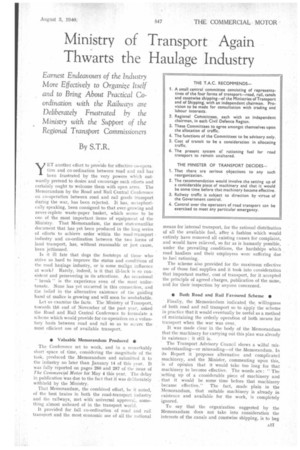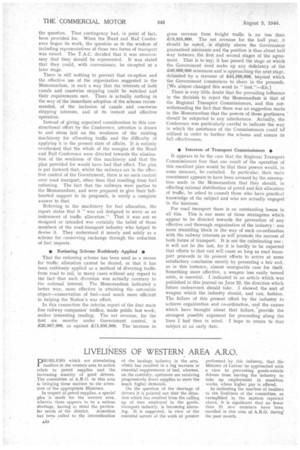Ministry of Transport Again
Page 19

Page 20

If you've noticed an error in this article please click here to report it so we can fix it.
Thwarts the Haulage Industry
Earnest Endeavours of the industry More Effectively to Organize itself and to Bring About Practical Co. ordination with the Railways are Deliberately Frustrated by the Ministry with the Support of the Regional Transport Commissioners
By S.T.R.
YET another effort to provide for effective co-opera tion and co-ordination between road and rail has been frustrated by the very powers which outwardly pretend to desire and encourage such efforts and certainly ought to welcome them with open arms. The Memorandum by the Road and Rail Central Conference on co-operation between road and rail goods transport during the war, has been rejected. It has, metaphorically speaking, been consigned to that ever-growing and never-replete waste-paper basket, which seems to be one of the most important items of equipment of the Ministry. That Memorandum, the most statesmanlike document that has yet been produced in the long series of efforts to achieve order within the road-transport industry and co-ordination between the two forms of land transport, has, without reasonable or just cause, been jettisoned.
Is it ill fate that dogs the footsteps of those who strive so hard to improve the status and conditions of the road haulage industry, or is some malign influence at work? Rarely, indeed, is it that ill-luck is so consistent and persevering in its attentions. An occasional " break " is the experience even of the rnost unfortunate. None has yet occurred in this connection, and the belief in the alternative existence of the guiding hand of malice is growing and will soon be unshakable.
Let us examine the facts. The Ministry of Transport, towards tilt end of November of the past year, asked the Road and Rail Central Conference to formulate a scheme which would provide for co-operation on a voluntary basis between road and rail so as to secure the most efficient use of available transport,
• Valuable Memorandum Produced •
The Conference set to work, and in a remarkably short space of time, considering the magnitude of the task, produced the Memorandum and submitted it to the industry no later than January 14 of this year. It was fully reported on pages 286 and 287 of the issue of The Commercial Motor for May 4 this year. The delay in publication was due to the fact that it was de:iberately withheld by the Ministry.
That Memorandum, the combined effort, lw it noted, of the best brains in both the road-transport industry and the railways, met with universal approva:, something almost unheard of in the transport world.
It provided for full co-ordination of road and rail transport and the most economic use of all the national
means for internal transport, for the rational distribution of all the available fuel, after a fashion which would entirely have removed all existing causes for complaint, and would have relieved, so far as is humanly possible, under the prevailing conditions, the hardships which road hauliers and their employees were suffering due to fuel rationing.
The scheme also provided for the maximum effective use of those fuel supplies and it took into consideration that important matter, cost of transport, for it accepted the principle of agreed charges, publication of the same, and for their inspection by anyone concerned.
• Both Road and Rail Favoured Scheme • Finally, the Memorandum indicated the, willingness of both road and rail transport so to apply the scheme in practice that it would eventually be useful as a method of maintaining the orderly operation of both means for transport when the war was over, It was made clear in the body of the Memorandum that the machinery for carrying out this plan was already in existence : it still is.
• The Transport Advisory Council shows a wilful misunderstanding—or misreading—of the Memorand urn. In its Report it -proposes alternative and complicated machinery, and the Minister, commenting upon this, is of opinion that it would take too long for that machinery to become effective. The words are: " The setting up of a considerable piece of machinery and that it would be some time before that machinery became effective." The fact, made plain in the Memorandum, that suitable machinery is already in existence and available for the work, is completely ignored.
To say that the organization suggested by the Memorandum does not take into consideration the interests of the canals and coastwise shipping, is to beg the question. That contingency had, in point of fact, been provided for. When the Road and Rail Conference began its work, the question as fo the wisdom of including representatives of those two forms of transport was raised. The T.A.C. decided that it was unnecessary that they should be represented. It was stated that they could, with convenience, be co-opted at a later stage.
There is still nothing to prevent that co-option and the effective use of the organization suggested in the Memorandum, in such a way that the interests of both canals and coastwise shipping could be watched and their requirements met. There is actually nothing in the way of the immediate adoption of the scheme recommended, of the inclusion of canals and coastwise shipping interests, and of its instant and effective operation.
Instead of giving organized consideration to this constructional effort by the Conference, attention is drawn to and stress laid on the weakness of the existing machinery for allocating traffic and the difficulty of applying it in the present state of affairs. It is entirely overlooked that the whole of the energies of the Road and Rail Conference were directed towards the elimination of the weakness of this machinery and that the plan provided for would have had that effect. The plea is put forward that, whilst the railways are in the effective control of the Govefnment, there is no such control over road transport, other than that resulting from fuel rationing. The fact that the railways were parties to the Memorandum, and were prepared to give their fullhearted support to its proposals, is surely a complete answer to that.
Referring to the machinery for fuel allocation, the report states that it "was not designed to serve as an instrument of traffic allocation." That it was not so designed or intended was certainly the belief of those members of the road-transport industry who helped to devise it. They understood it merely and solely as a scheme for conserving exchange through the reduction of fuel imports.
• Rationing Scheme Ruthlessly Applied • That the rationing scheme has been used as a means for traffic allocation cannot be denied, or that it has been ruthlessly applied as a method of diverting traffic from road to rail, in many cases without any regard to the fact that such diversion was actually contrary to the national interest. The Memorandum indicated a better way, more effective in attaining the ostensible object—conservation of fuel—and much more efficient in helping the Nation's war effort.
In this connection the interim report of the four main line railway companies' traffics, made public last week, makes interesting reading. The net revenue, for the first six months under Government control, is £20,867,000, as against 413,835,000. The increase in gross revenue from freight traffic is no less than £19,855,000. The net revenue for the half, year, it should be noted, is slightly above the Government guaranteed minimum and thQ position is thus about half way between the first and second stages of the agreement. That is to say, it has passed the stage at which the Government need make up any deficiency of the £40,000,000 minimum and is approaching the next Stage, delimited by a revenue of 243,500,000, beyond which the Government commences to share in the proceeds. [We almost changed this word to "loot."—ED.] There is very little doubt that the prevailing influence in the decision to reject the Memorandum is that of the Regional Transport Commissioners, and this notwithstanding the fact that there was no suggestion made in the Memorandumthat the powers of those gentlemen should be subjected to any interference. Actually, the Conference was particularly careful to indicate the way in which the assistance of the Commissioners could be utilized in order to further the scheme and ensure its full effectiveness.
• Interests of Transport Commissioners • It appears to be the case that the Regional Transport Commissioners fear that. one result of the operation of this excellent plan would be that their powers would, in some measure, be curtailed. In particular, their main resentment appears to have been aroused by the assumption made in the Memorandum that they should, in effecting rational distribution of petrol and fair allocation of traffic, be asked to consult those who have practical knowledge of the subject and who are actually engaged in the business.
For road transport there is an outstanding lesson in all this. This is one more of those stratagems which appear to be directed towards the prevention of any effective and thorough organization of the industry: one more stumbling block in the way of such co-ordination with the railway interests as will promote the success of both forms of transport. It is not the culminating one: it will not be the last, for it is hardly to be expected that efforts to that end will cease so long as road transport proceeds in its present efforts to arrive at some satisfactory conclusion merely by presenting a fair and, as in this instance, almost unarguable case for itself. Something more effective, a weapon less easily turned aside, is essential. I indicated in an article which was published in this journal on June 22, the direction which future endeavours should take. I showed the sort of weapon which the industry should, and can, fashion. The failure of this present effort by the industry to achieve organization and co-ordination, and the causes which have brought about that failure, provide the strongest possible argument for proceeding along the lines I had then in mind. I hope to return to that subject at an early date.




















































